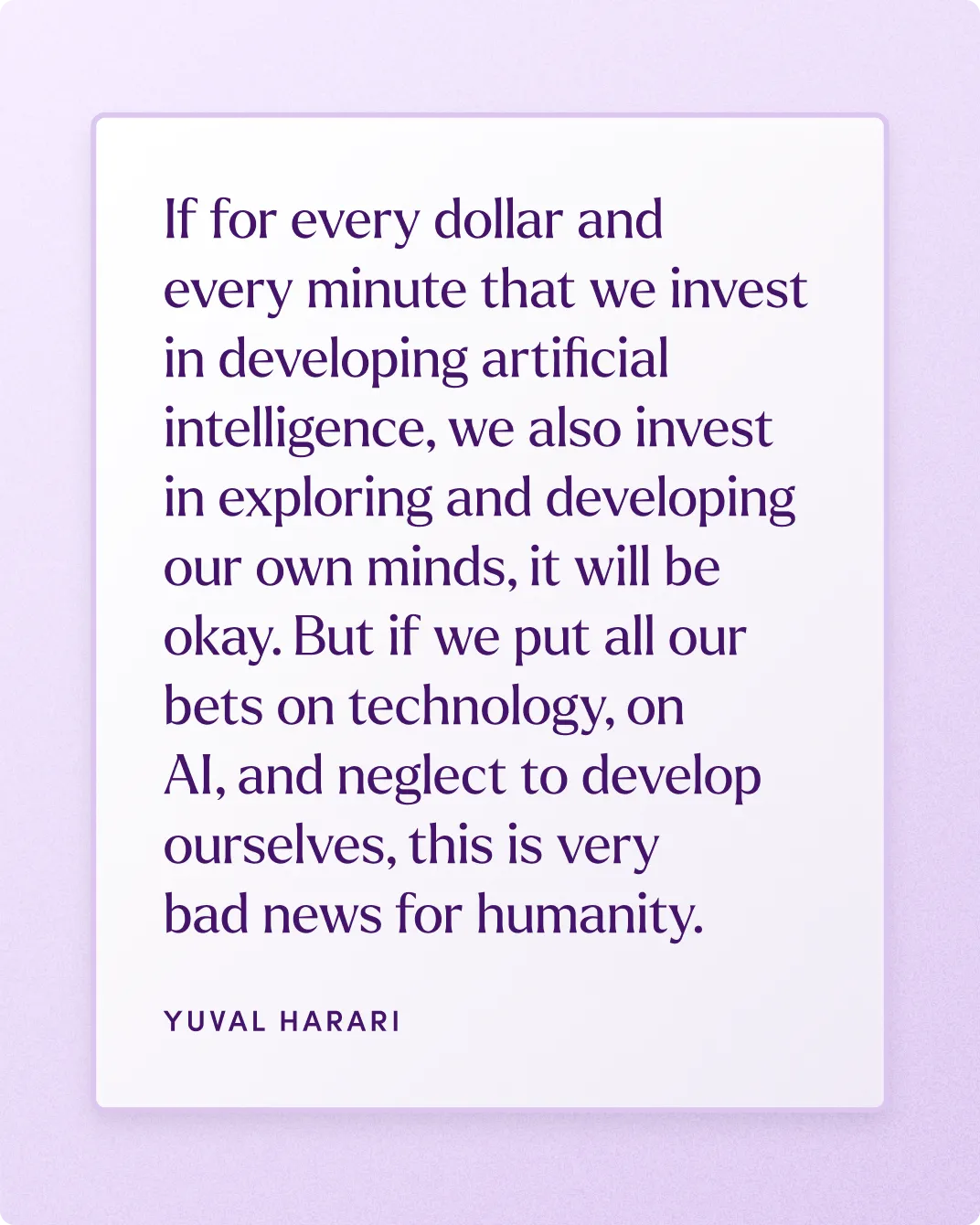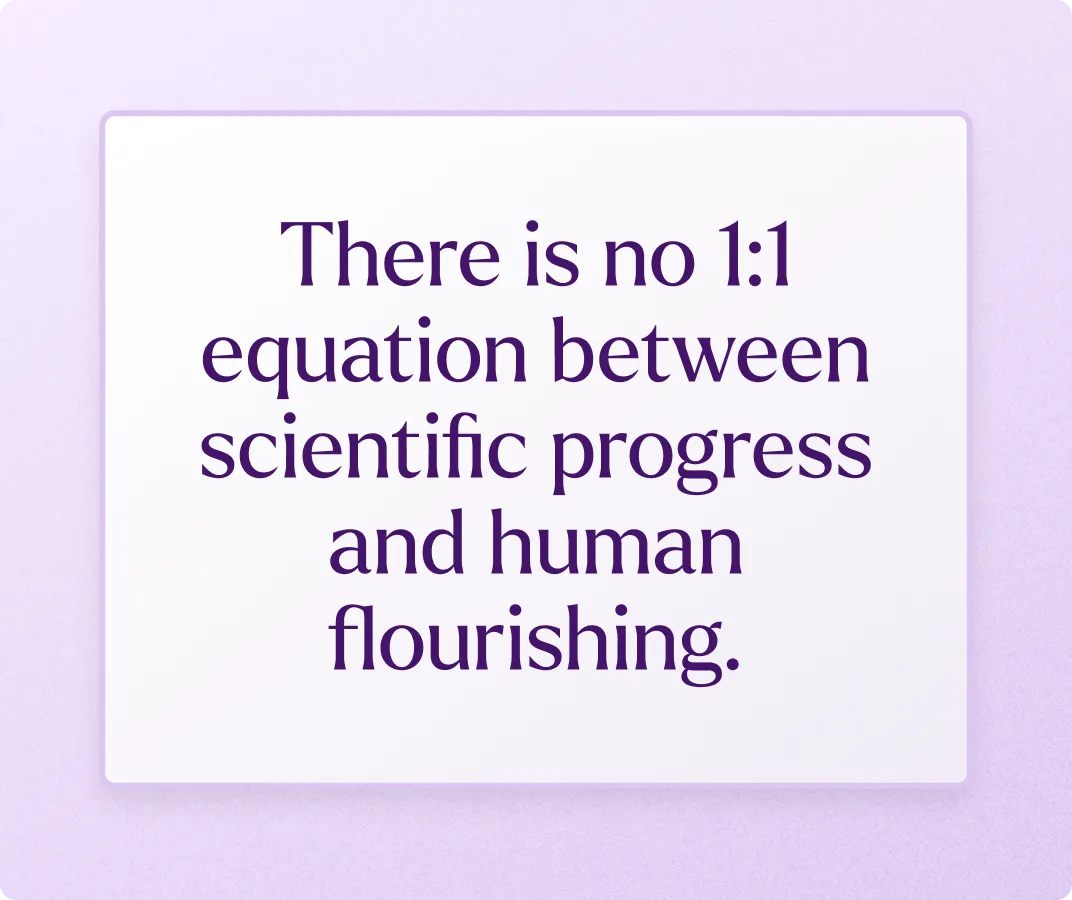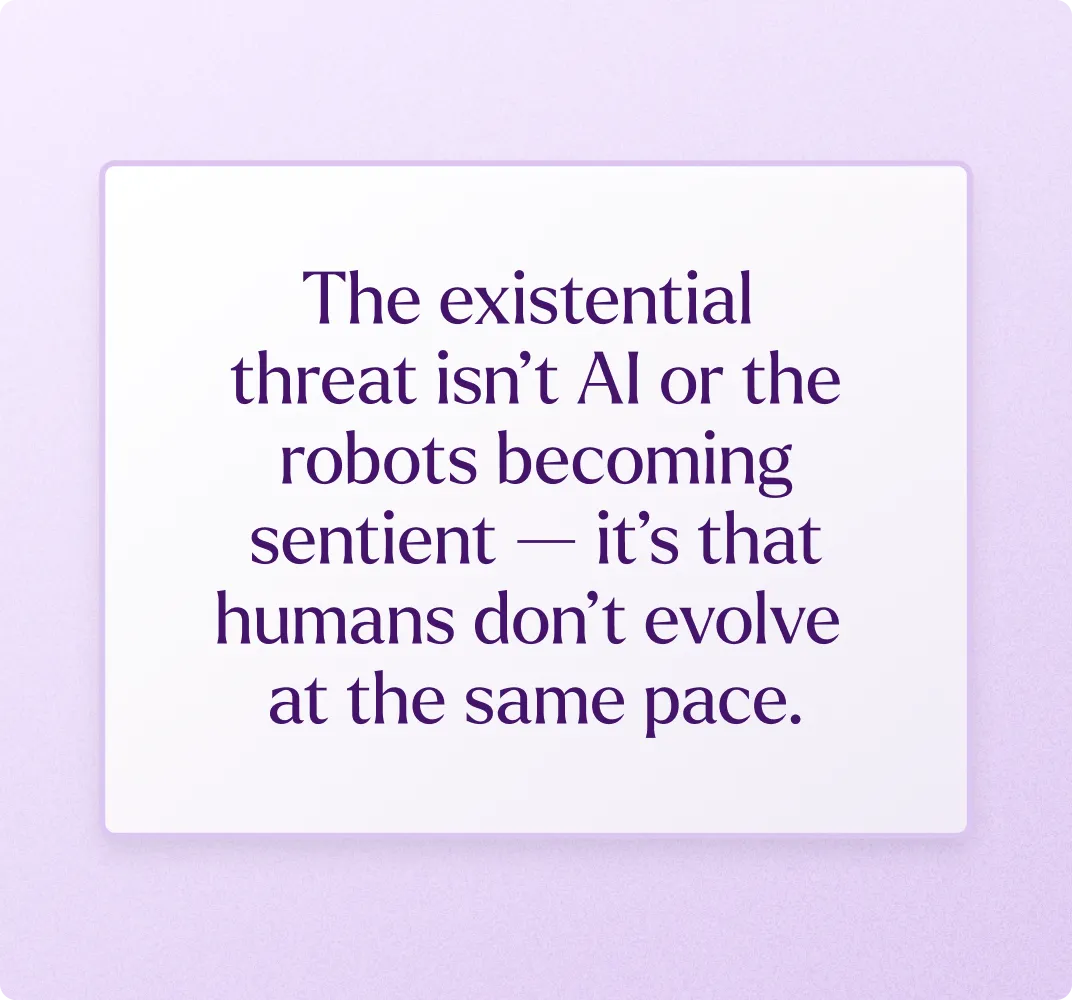Now that AI is here and we’ve made first contact, we need to ask ourselves, are we making the most of this transformative technology? The delta between what we know about our health and our actual health has never been greater. The science is clear on what we should be doing in our daily lives — our food, movement, sleep, stress management and connections — to stay healthy. I've been thinking about how AI can help us close that delta, and here are 12 of my thoughts:
AI needs a bigger narrative that touches people’s hearts and minds. Because there are two audiences at play, and so far those building AI have been speaking only to one of them: the small circle of those in technology, business and media. In this next AI chapter, they need to speak more to the second audience, which happens to be the rest of the world. Especially since a new Pew Research poll found that three-quarters of AI experts think the technology will benefit them personally, but only a quarter of the public does, while 51% of U.S. adults are more concerned about AI than excited.
And increasingly, the story most people are hearing is about how AI is going to take their jobs. A recent Axios piece reported on the trend of CEOs “giving employees an AI fright — warning them the new technology could make many workers obsolete, while at the same time urging them to start using it right away.” We need a new story on how AI can empower us and tangibly improve our health, education, relationships and much more.
We’re hard-wired to grow and evolve and become the best versions of ourselves. Those are our built-in prompts. But how are we responding to them? And how can we use AI to help us fulfill our purpose, both individually and collectively?
AI is evolving rapidly. And to make the most of it in our lives, we also need to invest in our own growth and evolution. Investing in helping humans evolve should be as high a priority as investing in AI.

Incorporating the latest science on the importance of our daily behaviors — food, movement, sleep, stress management and connection — into our daily lives to improve our health has been a big challenge. One of the reasons is that, as the science of what makes us healthier has become more robust, so has the science that keeps us addicted to our phones, that pushes us into a diet of ultraprocessed foods, that creates a world in which being sedentary is the norm. Closing that gap between what we know we should be doing and what we’re actually doing requires behavior change, which AI is uniquely suited for.
Much of the conversation I see around AI is built on the assumption that as science and technology become more sophisticated, life will inevitably get better. But as we can see from the current state of the world, there’s definitely not a 1:1 equation between the level of scientific progress and human flourishing. Scientific progress has risen steadily and, in recent years, exponentially. And yet, we have increasing rates of depression, anxiety, loneliness, suicides and deaths of despair, and an epidemic of chronic diseases. We need the same relentless focus we have on scientific progress applied to empowering people to improve their physical, mental and spiritual health.

As OpenAI CEO Sam Altman put it, AI is going to “be more like the Renaissance than the Industrial Revolution.” At the moment, AI is largely talked about in terms of making people more productive. But productivity is hardly the only metric that matters. The Renaissance wasn’t just about new efficiencies and scientific discovery. It was also about expanding human consciousness through art, music, nature and inner exploration. This is a better description of the potential of AI.
There are many AI doomsayers who believe that the greatest risk is that AI turns on humans and destroys the human race. But to me, the greatest risk is that humans won’t keep pace with AI. AI is already surpassing human intelligence but that puts into even starker relief the uniquely human qualities that lie beyond intelligence: empathy, resilience, creativity, compassion, courage and our capacity to connect with something larger than ourselves. Those are much more fundamental metrics to define humanity by than intelligence. So as AI becomes more intelligent, we can keep pace by growing and cultivating those uniquely human qualities. Failure to do that is a bigger threat than robots.

We are hard-wired to care about other people. But caring and empathy are not fixed qualities we’re either born with or not. They are qualities that have to be nurtured. We become compassionate by practicing compassion, empathetic by practicing empathy, caring by practicing caring. Both our better angels and our lesser angels are always in play. As Alexander Solzhenitsyn wrote, “The line separating good and evil passes not through states, nor between classes, nor between political parties either — but right through every human heart — and through all human hearts. This line shifts. Inside us, it oscillates with the years.”
To thrive, people need to be in an ecosystem that augments and supports their better angels, instead of one that exploits their lesser angels. At the moment, much of our technology, especially social media, exploits what’s worst in us: our anger, our jealousy, our biases and our fears, keeping us in a perpetual storm of outrage. That’s not a byproduct. That is the product. With AI we have the opportunity — with the benefit of hindsight and eyes wide open — to build a defense against those technologies.

In the conversation about the future of AI and health, we hear a lot about creating new drugs and new diagnostic treatments and even curing all diseases. New drugs and medical treatments are great, but we’re definitely not going to cure all diseases as long as people eat junk, live largely sedentary, sleep-deprived lives, and are increasingly stressed and burned out and disconnected from family, friends and themselves. Right now, most of these metrics are actually going in the wrong direction. As incredibly important as AI is going to be within the traditional medical system, health is also what happens between doctor visits. That’s the moonshot potential of AI.
As the machines are getting better and better, we’re not asking the more important question: are humans getting better? And how can we use AI to make humans physically, mentally, emotionally and spiritually better?

At the core of philosophy and religion is the idea of self-knowledge. To become who we want to be we have to know who we are. In ancient Greece it was distilled in the simple Delphic admonition at the Temple of Apollo, “Know thyself.” The Bhagavad Gita exhorts us to take up the “sword of self-knowledge.”
With its ability to process and store several billion data points, and with its super-human memory, AI can know us better than we know ourselves. It can use that knowledge to improve our physical health, which puts us in a stronger position to make wiser choices that nourish those deeper parts of ourselves (instead of choosing that quick but empty dopamine rush when we’re depleted). And AI will also know what sacred texts, music and nature move us, and will even recall that piece of poetry that inspired you in middle school that you almost certainly will have forgotten.
So we can use AI not just to know much more about the world around us, but to discover more about the world inside us. AI can give us real-time personalized nudges and recommendations when we most need them to keep us connected to that centered place of wisdom and strength.